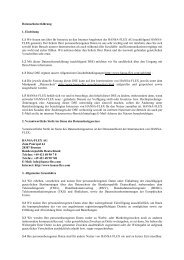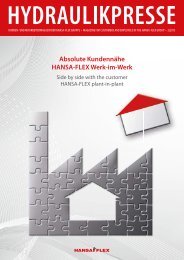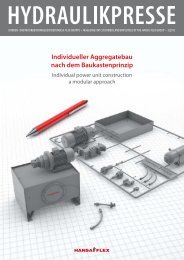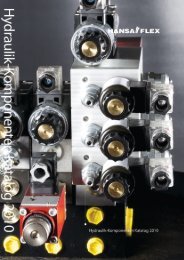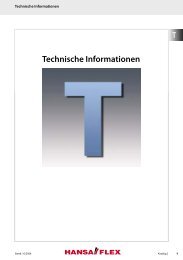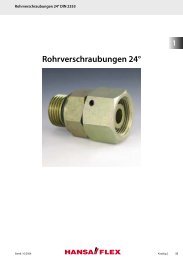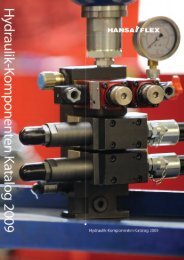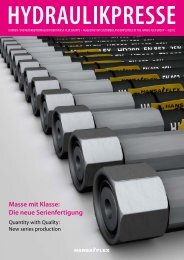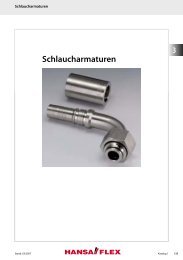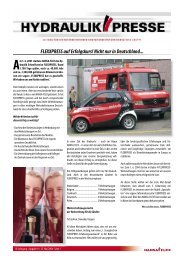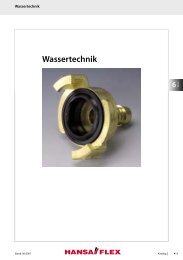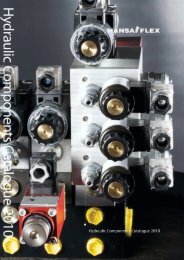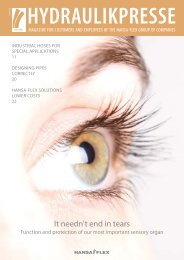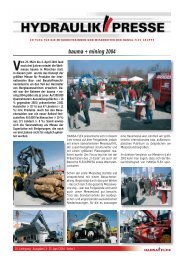HYDRAULIKPRESSE 2/2013 - einseitig - Hansa Flex
HYDRAULIKPRESSE 2/2013 - einseitig - Hansa Flex
HYDRAULIKPRESSE 2/2013 - einseitig - Hansa Flex
Sie wollen auch ein ePaper? Erhöhen Sie die Reichweite Ihrer Titel.
YUMPU macht aus Druck-PDFs automatisch weboptimierte ePaper, die Google liebt.
work & lIFe arBeiT & leBen<br />
Foto/Photo: Bundesministerium der Finanzen (www.zoll.de)<br />
Foto/Photo: iStockphoto<br />
Ob am Flughafen oder auf der straße: Zollkontrollen sind bei jedem Grenzübertritt möglich.<br />
at the airport or on the road: customs inspections are possible at every border crossing.<br />
anyone who intends to import goods from abroad must be thoroughly<br />
familiar with the applicable customs and import regulations.<br />
Many of those affected, particularly holidaymakers, look upon customs and the<br />
associated inspections as a nuisance. But customs protect the economy from distortion<br />
of competition, consumers from substandard goods from abroad, and the<br />
population from transnational criminality. In Germany, the Customs administration<br />
employs over 40,000 staff at more than 250 customs offices. In 2011 alone,<br />
it earned over 123 billion euro. the primary objective of the Customs administration<br />
is to combat economic crime – from product piracy to classic tax evasion. It<br />
also serves to protect consumers as well as combating terrorism and preventing<br />
violations of species protection provisions. and it is the debt collector for the German<br />
Federal republic. It is empowered to collect unpaid receivables from foreign<br />
debtors both inside the country and at customs checkpoints at the border. In 2011,<br />
the Customs administration added almost 1.2 billion euro to the domestic budget<br />
this way.<br />
dO nOT exceed duTy-Free liMiTs<br />
there is a lot to remember, especially for people who are travelling. Because holidays<br />
abroad are often the occasion for carefree shopping, after all, the chances of<br />
finding great bargains are good. whether these are items of clothing purchased<br />
in the USa, electronics in Japan or wine in Italy: But you should always find out<br />
what quantities of the goods in question can be imported into your home country<br />
without paying customs duties. It is true, customs borders no longer exist within<br />
the european Union. as a result, in general products that are intended for personal<br />
use can be brought home without incurring any customs payments. But there are<br />
limits above which even these items cannot be imported entirely free of charge.<br />
Individuals travelling by air or sea from non-eU countries can bring goods up to a<br />
value of 430 euro into the eU without payment. For visitors travelling by rail or bus,<br />
and those driving cars, the customs-free limit is 300 euro. If the value of the goods<br />
they are bringing in exceeds this limit, customs duty must be paid on them. If the<br />
duty-free allowance is exceeded, the goods are subject to 19 per cent vat as well<br />
as the applicable customs duty rate, which varies from two to 15 per cent.<br />
although these two general travel allowances apply, many goods may only be<br />
imported in limited quantities regardless of their value.<br />
THe FOllOWinG Guidelines apply<br />
• within the eU, individuals may bring with them either 800 cigarettes, or 400<br />
cigarillos, or 200 cigars or one kilogram of tobacco. on the other hand, if they are<br />
travelling from a non-eU country they are limited to either 200 cigarettes, 100<br />
cigarillos, 50 cigars or 250 g smoking tobacco.<br />
• within the eU, individuals may bring with them either ten litres of spirits, or ten<br />
litres of flavoured alcohol beverages, or 20 litres of intermediate products such as<br />
fortified wine or vermouth, or 90 litres of wine or up to 110 litres of beer. For those<br />
travelling from a non-eU country, one litre of spirits, two litres of sparkling or fortified<br />
wine, four litres of non-sparkling wine or 16 litres of beer are duty-free.<br />
• within the eU, ten kilos of coffee are permitted. Individuals travelling from noneU<br />
countries may bring with them 500 grams of coffee or 200 grams of coffee<br />
extracts, essences or concentrates.<br />
• Individuals arriving from non-eU countries may bring technical goods with a<br />
value up to 300 euro into the eU duty-free.<br />
• It is also permitted to import 50 grams of perfume and 0.25 litre eau de toilette.<br />
• travellers both inside and outside the eU may bring up to 10,000 euro in cash with<br />
them without having to declare it.<br />
• Fuel may only be imported duty-free from an eU member state if the fuel is in the<br />
vehicle’s fuel tank or in a reserve tank on board the vehicle. however, the quantity<br />
that is carried should represent a reserve quantity – about 20 litres for a motor car,<br />
approximately 60 litres for a lorry.<br />
g<br />
<strong>HYDRAULIKPRESSE</strong> 2|<strong>2013</strong><br />
37



